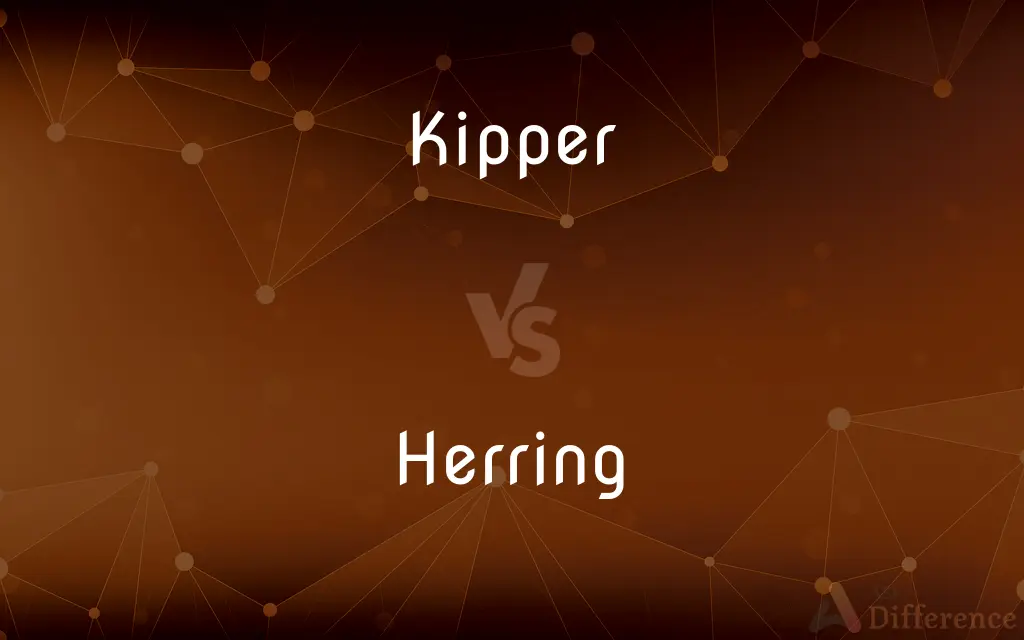Kipper vs. Herring — What's the Difference?
By Urooj Arif & Fiza Rafique — Updated on March 4, 2024
Kipper refers to a whole herring that has been split, cured, and smoked, while herring is a type of fish widely found in the Atlantic and Pacific Oceans.

Difference Between Kipper and Herring
Table of Contents
ADVERTISEMENT
Key Differences
Kipper is a specific preparation of herring, showcasing the culinary tradition of preserving fish. The process involves splitting the fish from head to tail, removing the innards, curing it in salt or brine, and then cold-smoking it. This method imparts a distinctive smoky flavor and extends the shelf life of the fish. Herring, on the other hand, is a silver-colored fish important both ecologically and commercially. It can be prepared in various ways, including fresh, canned, pickled, or as kippers.
Herring is celebrated for its nutritional value, being a rich source of omega-3 fatty acids, protein, and vitamins. When transformed into kippers, the fish retains much of its nutritional content, with the added flavors from the curing and smoking processes. However, the preservation methods can also increase the sodium content, making kippers a saltier option compared to fresh herring.
The popularity of herring extends across many cultures and cuisines, where it is enjoyed in a multitude of preparations beyond kippering. These include pickling, fermenting, and salting. Kippers, specifically, are a traditional British breakfast dish, often served grilled or fried with a range of accompaniments.
Environmental considerations play a role in the fishing and consumption of herring. Sustainable fishing practices are crucial to maintaining herring populations and ecosystems. The method of preparing kippers does not directly impact these considerations but highlights the importance of choosing sustainably sourced herring.
The choice between herring and kippers may depend on culinary preferences, dietary restrictions, or environmental concerns. Both offer a taste of the sea, but kippers bring the added dimensions of smokiness and a rich preservation tradition, while fresh herring offers versatility and a direct connection to marine flavors.
ADVERTISEMENT
Comparison Chart
Definition
A smoked and cured herring
A type of small, silver-colored fish
Preparation
Split, brined or salted, and cold-smoked
Varied (can be eaten fresh, pickled, canned, or smoked)
Taste
Smoky and salty
Mild, with a distinct marine flavor
Nutritional Value
High in omega-3 fatty acids, protein; higher in sodium
High in omega-3 fatty acids, protein; lower in sodium
Culinary Uses
Traditionally served for breakfast in the UK
Versatile; used in various dishes worldwide
Preservation Method
Curing and smoking
Fresh, pickled, salted, or smoked
Cultural Significance
British tradition
Widespread across many cultures
Sustainability
Depends on herring stocks and fishing practices
Subject to overfishing concerns; sustainable practices important
Compare with Definitions
Kipper
Made by splitting and curing herring before smoking.
The kipper's unique taste comes from the cold-smoking process.
Herring
A versatile fish enjoyed fresh, pickled, or smoked.
Fresh herring is a delicacy in many coastal communities.
Kipper
Often served grilled or fried.
He enjoyed his kippers with a side of scrambled eggs.
Herring
Subject to sustainable fishing practices.
Sustainable herring fisheries help maintain the balance of marine ecosystems.
Kipper
A source of essential nutrients, albeit with higher sodium.
Despite their saltiness, kippers are a healthy protein choice.
Herring
Can be transformed into various products, including kippers.
Herring is the primary fish used to make kippers.
Kipper
Can be stored longer than fresh fish.
Kippers made from herring can last several weeks when properly refrigerated.
Herring
Rich in omega-3 fatty acids and protein.
Dietitians often recommend herring for a heart-healthy diet.
Kipper
A smoked herring, known for its rich, smoky flavor.
Kippers are a staple in traditional British breakfasts.
Herring
Used in a variety of dishes worldwide.
Pickled herring is a traditional snack in Scandinavian countries.
Kipper
A kipper is a whole herring, a small, oily fish, that has been split in a butterfly fashion from tail to head along the dorsal ridge, gutted, salted or pickled, and cold-smoked over smouldering woodchips (typically oak). In Britain, Ireland and some regions of North America, kippers are most commonly consumed for breakfast.
Herring
Herring are forage fish, mostly belonging to the family Clupeidae. Herring often move in large schools around fishing banks and near the coast, found particularly in shallow, temperate waters of the North Pacific and North Atlantic Oceans, including the Baltic Sea, as well as off the west coast of South America.
Kipper
A herring or salmon that has been split, salted, and smoked.
Herring
Any of various silvery fishes of the family Clupeidae, especially the commercially important Clupea harengus of the northern Atlantic Ocean and C. pallasii of the northern Pacific Ocean.
Kipper
To prepare (fish) by splitting, salting, and smoking.
Herring
A type of small, oily fish of the genus Clupea, often used as food.
Kipper
A split, salted and smoked herring or salmon.
Herring
Fish in the family Clupeidae.
Kipper
A salmon split open, salted, and dried or smoked; - so called because salmon after spawning were usually so cured, not being good when fresh.
Herring
Fish similar to those in genus Clupea, many of those in the order Clupeiformes.
Kipper
Salted and smoked herring
Herring
One of various species of fishes of the genus Clupea, and allied genera, esp. the common round or English herring (Clupea harengus) of the North Atlantic. Herrings move in vast schools, coming in spring to the shores of Europe and America, where they are salted and smoked in great quantities.
Herring
Valuable flesh of fatty fish from shallow waters of northern Atlantic or Pacific; usually salted or pickled
Herring
Commercially important food fish of northern waters of both Atlantic and Pacific
Common Curiosities
What is a kipper?
A kipper is a herring that has been split, cured, and smoked, known for its smoky flavor and longer shelf life.
What are the nutritional benefits of herring?
Herring is high in omega-3 fatty acids and protein, making it beneficial for heart health.
Can you eat kippers raw?
Kippers are usually cooked (grilled or fried) before eating, despite being cured and smoked.
Is there a difference in taste between kippers and fresh herring?
Yes, kippers have a smoky and salty taste, while fresh herring has a milder, distinct marine flavor.
What is herring?
Herring is a small, silver-colored fish found in the Atlantic and Pacific Oceans, valued for its nutritional content and versatility in cooking.
How is a kipper made from herring?
To make a kipper, herring is split, brined or salted, and then cold-smoked.
How does the preservation of kippers extend their shelf life?
The curing and smoking processes reduce moisture and add preservatives, extending the shelf life compared to fresh fish.
What makes kippers a popular breakfast dish in the UK?
Kippers are cherished for their rich flavor and traditional role in British cuisine, often served with eggs and bread.
What are the environmental considerations for eating herring and kippers?
Choosing sustainably sourced herring is important for both environmental health and the sustainability of kippers.
How can herring be prepared aside from making kippers?
Herring can be eaten fresh, pickled, canned, or salted, offering a wide range of culinary uses.
Why is sustainability important in herring fishing?
Sustainable practices are crucial to prevent overfishing and ensure the long-term health of herring populations and marine ecosystems.
How do culinary traditions influence the consumption of herring and kippers?
Culinary traditions, such as the British preference for kippers at breakfast, play a significant role in how these foods are prepared and enjoyed.
What should consumers look for when buying herring or kippers?
Consumers should look for sustainably sourced products and, in the case of kippers, be mindful of the sodium content based on dietary needs.
Are kippers healthy?
Kippers are healthy due to their high protein and omega-3 content, though they are higher in sodium than fresh herring.
Can kippers be part of a balanced diet?
Yes, kippers can be a part of a balanced diet, especially when balanced with low-sodium food options.
Share Your Discovery

Previous Comparison
Vampire vs. Oupire
Next Comparison
Gifted vs. TalentedAuthor Spotlight
Written by
Urooj ArifUrooj is a skilled content writer at Ask Difference, known for her exceptional ability to simplify complex topics into engaging and informative content. With a passion for research and a flair for clear, concise writing, she consistently delivers articles that resonate with our diverse audience.
Co-written by
Fiza RafiqueFiza Rafique is a skilled content writer at AskDifference.com, where she meticulously refines and enhances written pieces. Drawing from her vast editorial expertise, Fiza ensures clarity, accuracy, and precision in every article. Passionate about language, she continually seeks to elevate the quality of content for readers worldwide.















































